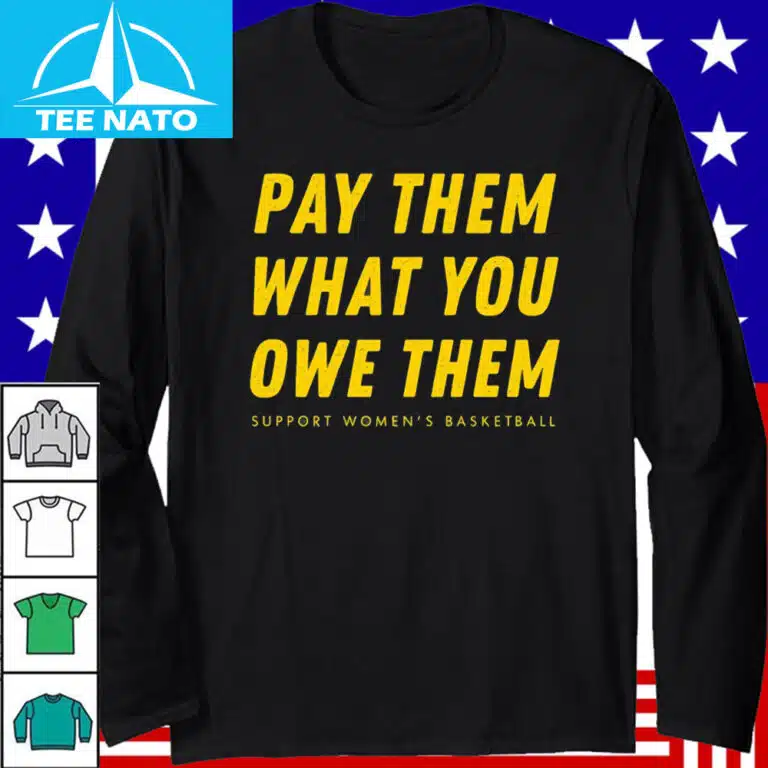Advocate for Just Compensation – Wear the “Pay Them What You Owe Them” Tee
Advocate for Just Compensation – Wear the “Pay Them What You Owe Them” Tee
The “Pay Them What You Owe Them” Tee is far more than mere attire—it’s a bold declaration. This striking garment championing equitable wages, employee entitlements, and financial fairness. Whether you’re protesting salary exploitation or backing labor movements, this tee serves as a potent conversation catalyst.
The Significance of the “Pay Them What You Owe Them” Tee
Before delving into its influence, let’s understand why this tee resonates deeply with so many individuals. It symbolizes unity with underpaid laborers and confronts systemic disparities within the workplace.
The Underlying Message of the Slogan
The slogan “Pay Them What You Owe Them” is not merely a demand—it’s a moral imperative. It targets employers who exploit labor, delay payments, or refuse equitable remuneration.
Wearing this tee aligns you with movements striving for liveable incomes, such as the Fight for $15 initiative. It’s a wearable protest, making financial injustice visible in everyday environments.

Styling Your “Pay Them What You Owe Them” Tee
This tee isn’t restricted to demonstrations—it can seamlessly integrate into your daily attire. Combine it with denim for a relaxed style or layer it beneath a blazer for a refined yet activist-inspired ensemble.
For maximum impact, don it at rallies, union meetings, or even casual social gatherings where discussions about labor rights can arise.

Real-World Instances of Wage Advocacy
Consider the Amazon warehouse staff who organized strikes for improved compensation—many sported similar messages. Or the independent artists who utilize social media to expose clients who refuse fair payment.
These narratives illustrate how apparel can amplify voices and ensure corporate accountability.
The Evolution of Protest Attire
Fashion has consistently been interwoven with activism. From suffragette sashes to Black Power symbols, clothing communicates potent messages.
Comparing Past and Present Advocacy
In the 1960s, civil rights proponents carried “I AM A MAN” placards to assert dignity. Today, the “Pay Them What You Owe Them” Tee embodies the same spirit—affirming the value of workers.
Both movements leverage simplicity to convey profound statements, proving that conciseness can be more impactful in advocacy.
Why T-Shirts Are Effective Tools for Protest
They are affordable, easily obtainable, and customizable. Unlike banners or placards, they transform the wearer into a mobile advertisement for societal change.
Furthermore, they humanize complex issues, rendering them relatable to observers.
Beyond the Tee: Supporting Fair Wage Initiatives
While sporting the “Pay Them What You Owe Them” Tee is significant, genuine transformation necessitates tangible effort.
Familiarize Yourself with Labor Legislation
Many employees are unaware of their entitlements concerning overtime, minimum wage, or contractual disagreements. Grasp local labor statutes to effectively champion yourself and others.
Boycott Unscrupulous Employers
Back businesses that offer just compensation and expose those that do not. Consumer pressure can compel companies to amend their practices.
Join or Contribute to Worker Advocacy Organizations
Entities such as the Economic Policy Institute or regional unions require assistance. Offer your time, share resources, or donate to bolster their endeavors.
Conclusion
The “Pay Them What You Owe Them” Tee is a modest yet potent instrument in the pursuit of financial justice. By wearing it, enlightening others, and undertaking concrete actions, we can strive for a world where equitable wages are not a mere request—but a universal standard. `
POSTER SEO_SIBATOOL




